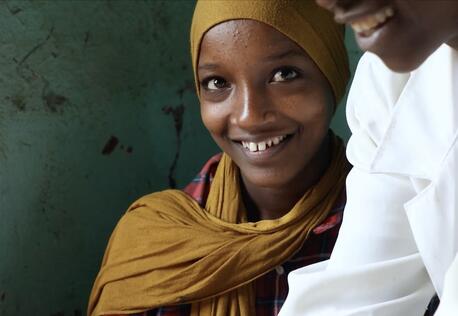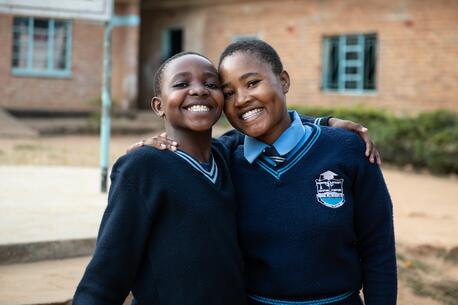
One Year After Harvey, UNICEF USA Is Still Supporting Houston's Kids
It's been a year since Houston was hit with its worst storm on record, traumatizing children and disrupting the start of a new school year. A look at the many ways UNICEF USA and its partners stepped in to help — and continue to support recovery efforts.
It was on Aug. 25, 2017, that Hurricane Harvey made landfall, slamming Texas and parts of Louisiana with Category-4 winds and heavy rains and causing catastrophic flooding — one of the worst weather disasters in U.S. history.
Some 13 million people were affected, including 3 million children in the hardest-hit areas in and around Houston. For many children who witnessed the destruction, as homes, schools and communities were being washed away, so too was their sense of security, normalcy and well being.
At the invitation of the Mayor of Houston, UNICEF experts quickly identified vulnerable communities, and UNICEF USA jumped in to assist with the response, joining partners in bringing both immediate relief and longer-term support to children and families affected by the storm.
In keeping with UNICEF's mandate — to ensure the fundamental survival, protection and well-being of children regardless of race, religion, geography, gender or politics — UNICEF USA leveraged its own resources and expertise and relationships on the ground to bring protection and assistance to those who needed it the most, advising local authorities and helping to train educators, provide psychosocial support and get kids back to learning.
Within months of the storm, the mental health needs of children were receiving renewed attention and resources.
Within months of the storm, the mental health needs of children were receiving renewed attention and resources. UNICEF USA and its partners continue to help children, families and educators address the acute trauma and distress caused by Hurricane Harvey, while also making unique investments to build community resilience, raise awareness and promote greater access to mental health services for the most vulnerable children and families.
Here's a look at some of the specifics of the response, and the impact so far:
Getting Kids Back to School
At the heart of UNICEF's mission to save and protect the world's children is the conviction that education transforms lives and builds better futures. When Hurricane Harvey left more than 1 million children in Texas unable to start school last September, UNICEF USA worked with partners to help the most disadvantaged among them resume their educations — working with local school officials to deliver learning materials and supplies to hundreds of teachers whose classrooms had suffered storm damage.
Volunteers helped fill School-in-a-Box kits. Longtime partner UPS helped with distribution of 442 kits to more than 12,600 students and teachers in the greater Houston area.

Houston teacher Jackie Garcia, above, has volunteered for UNICEF since 2010. This year, she helped prepare School-in-a-Box kits full of educational supplies for children and teachers in Houston whose schools were damaged by Hurricane Harvey. "When UNICEF USA partnered with UPS to prepare and deliver School-in-a-Box kits, I had to be there," Garcia wrote in this personal account of the experience.
Supporting Traumatized Children
Getting a child back to school and into a familiar routine in a supportive environment is an important part of recovery after a crisis. But children who have experienced trauma often need additional support. With that in mind, in the aftermath of Harvey, UNICEF USA teamed up with local government agencies, NGOs and academics to launch "train the trainer" programs in trauma awareness and response, to better enable educators to meet children's needs.
Through a program with The Center for School Behavioral Health at Mental Health America of Greater Houston (MHA), for example, 170 teacher trainers have already been trained in psychosocial and trauma support strategies — training that has since cascaded to over 1,600 other educators in 98 schools, home to 72,000 students. The approach emphasizes mindfulness, and includes practical guidance on how to avoid triggers and reduce student stress.
The training in psychosocial and trauma support strategies emphasizes mindfulness, and includes practical guidance on how to avoid triggers and reduce student stress.
MHA is also supporting evidence-based trauma and grief counseling in partnership with Texas Children’s Hospital and Save the Children, training some 60 clinicians to serve students suffering from acute trauma and grief through therapeutic groups on dozens of campuses.

Thanks to the psycho-educational training program supported by UNICEF USA, teachers at Moore Elementary School, one of 30 Houston-area schools that were severely impacted by Hurricane Harvey, are learning to be more sensitive to students and what to expect in terms of their behavior and academic performance, Jennifer D. Nichols, Moore's campus counselor, told The Houston Chronicle. "UNICEF is giving something very unique in helping teachers - especially homeroom teachers - with single event and complex event trauma and how it affects brain development," Nichols said. The parachute is a favorite activity during Nichols' own small group counseling sessions. Photo credit: The Houston Chronicle, courtesy of Moore Elementary School.
To ensure broader reach and ongoing trauma training for Houston-area educators, UNICEF USA helped MHA partner Kognito Solutions develop an innovative online interactive training course in trauma awareness and response that combines principles of neuroscience and social cognition with role-playing game mechanics. One Houston school district recently announced plans to have all 10,000 of its employees take the course, recognizing its value not only for hurricane response but also for dealing with the fallout from other traumatizing events, such as violence in schools.
Other program efforts are focused on supporting infants and young children under age five. Researchers from Rice University’s Baker Institute of Public Policy held a series of workshops to prepare parents and caregivers to handle the effects of trauma on developing brains. Preliminary results indicate an increase in confidence among participants in their abilities to support their little ones post-crisis. A complete analysis of the Rice study, conducted in partnership with the NGO First3Years, with support from UNICEF USA and curriculum support from The National Child Traumatic Stress Network, are expected to be published later this year.
Additional activities are planned in conjunction with the Houston Mayor's office to further strengthen support systems for young people, and improve their access to mental health and trauma recovery services.
Learn more about how UNICEF responds to hurricanes and other emergencies to save and protect vulnerable children, adolescents and families.
Top photo: In the aftermath of Hurricane Harvey, UNICEF USA President and CEO Caryl M. Stern (far right) travelled to Houston as part of UNICEF USA's efforts to ensure kids affected by the storm could get back to being kids as soon as possible. © UNICEF USA
HOW TO HELP
There are many ways to make a difference
War, famine, poverty, natural disasters — threats to the world's children keep coming. But UNICEF won't stop working to keep children healthy and safe.
UNICEF works in over 190 countries and territories — more places than any other children's organization. UNICEF has the world's largest humanitarian warehouse and, when disaster strikes, can get supplies almost anywhere within 72 hours. Constantly innovating, always advocating for a better world for children, UNICEF works to ensure that every child can grow up healthy, educated, protected and respected.
Would you like to help give all children the opportunity to reach their full potential? There are many ways to get involved.





